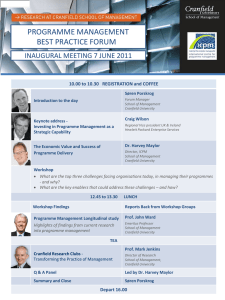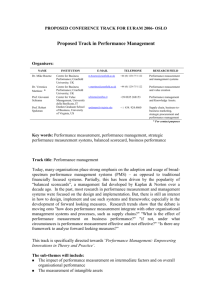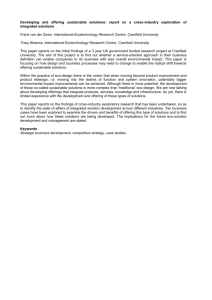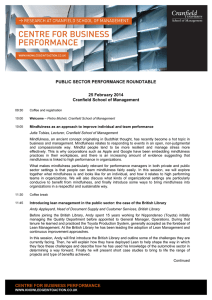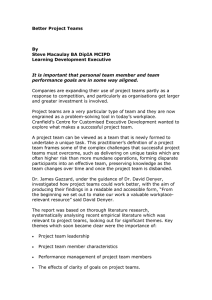RESEARCH SUMMARY RESEARCH AT CRANFIELD SCHOOL OF MANAGEMENT
advertisement
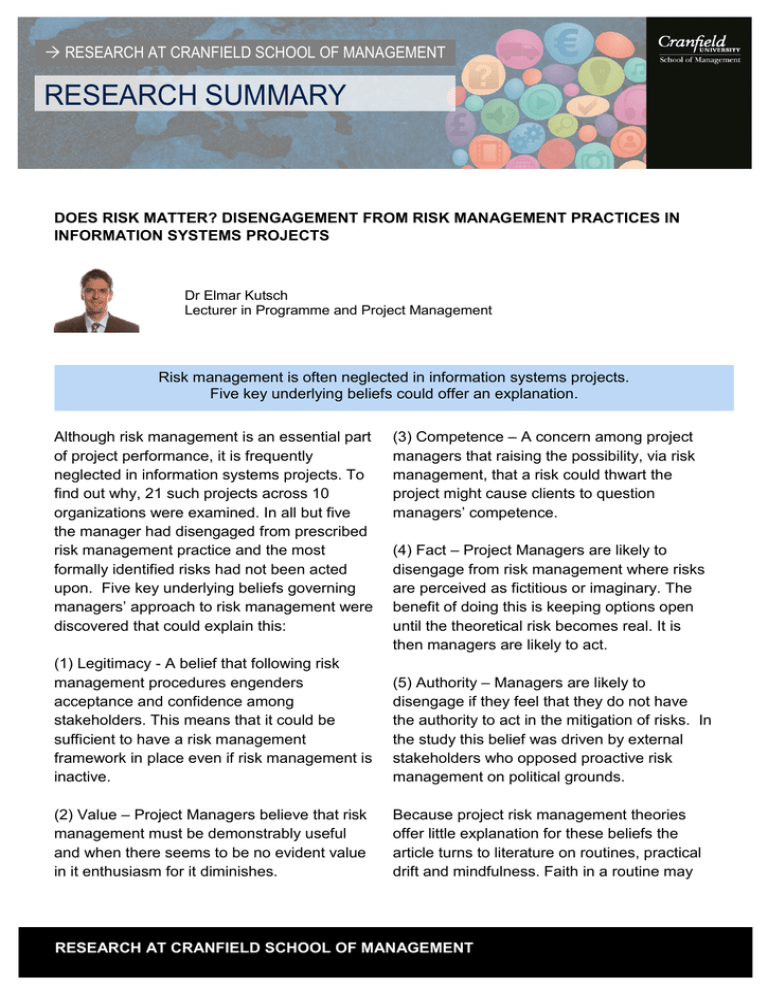
RESEARCH AT CRANFIELD SCHOOL OF MANAGEMENT RESEARCH SUMMARY DOES RISK MATTER? DISENGAGEMENT FROM RISK MANAGEMENT PRACTICES IN INFORMATION SYSTEMS PROJECTS Dr Elmar Kutsch Lecturer in Programme and Project Management Risk management is often neglected in information systems projects. Five key underlying beliefs could offer an explanation. Although risk management is an essential part of project performance, it is frequently neglected in information systems projects. To find out why, 21 such projects across 10 organizations were examined. In all but five the manager had disengaged from prescribed risk management practice and the most formally identified risks had not been acted upon. Five key underlying beliefs governing managers’ approach to risk management were discovered that could explain this: (3) Competence – A concern among project managers that raising the possibility, via risk management, that a risk could thwart the project might cause clients to question managers’ competence. (4) Fact – Project Managers are likely to disengage from risk management where risks are perceived as fictitious or imaginary. The benefit of doing this is keeping options open until the theoretical risk becomes real. It is then managers are likely to act. (1) Legitimacy - A belief that following risk management procedures engenders acceptance and confidence among stakeholders. This means that it could be sufficient to have a risk management framework in place even if risk management is inactive. (5) Authority – Managers are likely to disengage if they feel that they do not have the authority to act in the mitigation of risks. In the study this belief was driven by external stakeholders who opposed proactive risk management on political grounds. (2) Value – Project Managers believe that risk management must be demonstrably useful and when there seems to be no evident value in it enthusiasm for it diminishes. Because project risk management theories offer little explanation for these beliefs the article turns to literature on routines, practical drift and mindfulness. Faith in a routine may RESEARCH AT CRANFIELD SCHOOL OF MANAGEMENT be consistent but the performance of it adapts and shifts over time. When the routine no longer appears to be doing what it is intended to achieve - managers are likely to disengage. This has been described as “practical drift” and “the slow uncoupling of practice from procedure” (Snook 2000* p.24). The typical response here is to enforce compliance and preoccupation with this can diminish sensitivity to genuine risk. Because IS projects are unpredictable, empowering people to act quickly in response to the unexpected could be more effective than rigorously enforcing risk management compliance. Mindfulness could be encouraged through which people anticipate threats, make quick decisions and deliver corrective action while remaining alert to new information and retaining a capacity for critical judgement. The answer to neglect of risk management might lie in finding a balance between formal processes and mindfulness based reliability. It is suggested that future research should explore IS projects where managers disengage from risk management as drifting away from the process could impair a project’s performance. Kutsch, E., Denyer, D., Hall, M. & LeeKelley, L. 2012, ‘Does risk matter? Risk management practices in information systems projects’, European Journal of Information Systems. DOI: 10.1057/ejis.2012.6 For further details on this research paper please contact: elmar.kutsch@cranfield.ac.uk WATCH THE VIDEO INTERVIEW http://tinyurl.com/cver46f *Snook, S. 2000, Friendly fire: The Accidental Shootdown of U.S. Black Hawks over Northern Iraq. Princeton University Press, Oxford. Management Theme: Programme and Project Management MANAGEMENT THEMES AT CRANFIELD SCHOOL OF MANAGEMENT Business Economics and Finance Business Performance Management Corporate Responsibility and Sustainability Entrepreneurship and Business Growth General Management Information Systems Innovation and Operations Management Leadership Managing People and Global Careers Marketing, Sales and Client Relationships Programme and Project Management Strategy, Complexity and Change Management Supply Chain and Logistics Management
